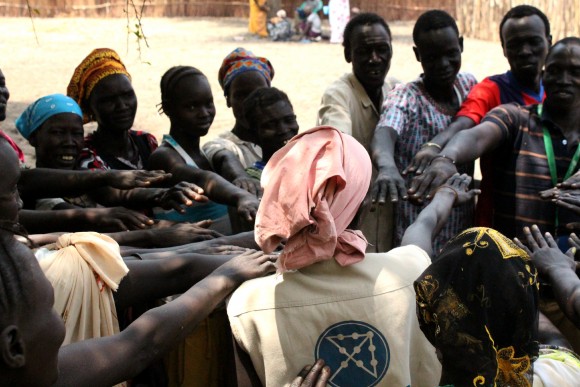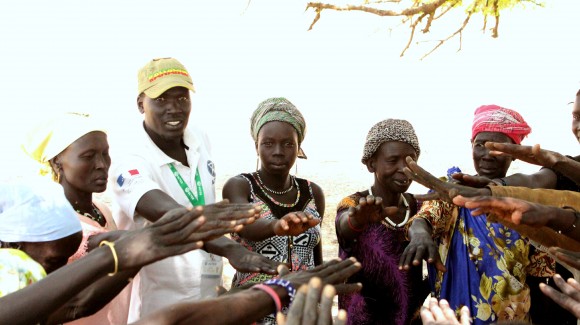With famine having been declared in Unity state of South Sudan in February, one would expect to hear of vulnerable individuals migrating to other parts of the country or neighboring countries in search of food. Despite high food insecurity in Jonglei state, which is bordered by Unity state to the North West, Ruth, residing in one of Jonglei states, Akobo East, is not one of them. As the world celebrates International Women’s Day, Ruth celebrates her bold moment- joining an Agro Pastoral Field School group.
“Being a woman in South Sudan means being resilient”
In South Sudan, ACTED works with 30 Agro Pastoral Field Schools (APFS) in Akobo East County under a project funded jointly by SDC and French Embassy. Each APFS has 30 members, making a total of 900 members. These group-based field schools combine agroecology and community development methodologies for more sustainable crop yields and community empowerment.
Since 2015, Ruth has actively participated in APFS trainings on modern farming techniques, like the use of treadle pumps and irrigation kits during the wet and dry seasons. When asked what prompted her to join one of these schools, Ruth says she didn’t join by chance:
Being a woman in South Sudan means being resilient. Having been an active participant of APFS sessions, I have learned, observed, voiced my opinions, and made decisions that have reduced my vulnerability to food insecurity.
“ACTED has made seeds and farm inputs more accessible and available in my village, which has poor roads and is very far from the market,” she says with admirable determination.

Decision making remains a task for the men, especially in rural areas of South Sudan. However, through the APFS groups, emphasis is placed on involvement of both women and men in decision-making. Through a participatory approach, women and men are provided with information which enables them to make smart decisions on how, when, where to farm.
It is on this platform that Ruth has learned to make climate-smart decisions. Stemming from her bold moment above, she has gunned a couple of achievements. For instance, having participated in ACTED’s pilot project on dry season vegetable and crop irrigation last year November, Ruth has sold her vegetables and acquired enough money to buy more land in Akobo. She plans to cultivate more land for the next main planting season. Her strategy is simple and straight forward:
Once I plant on a larger piece of land, I will have more harvest, sell more, earn more, and provide for my family better. I need to keep my girls and boys in school.
Choosing optimism for sustainable change

What is fascinating about Ruth is her ability and willingness to take charge of her future, to choose optimism, and to work hard for better returns. In Akobo, as in other parts of South Sudan, in popular imagination women are associated with the kitchen and absence of control of their life: they own no property, and don’t participate in decision making forums. Ruth challenges such cultural views, shaking them to the very core, and making her emerge as a role model to other women in her village. APFS have provided her a long yearned opportunity to be heard, to make her own informed decisions, to learn, to participate at the community level, and to realise her potential.
Having watched me progress from farming on one acre piece of land to two acres within a year, women from my village want nothing but to join our APFS group
After observing Ruth’s remarkable progress and empowerment, other women of her village are keen to join APFS groups as well: “By participating in APFS sessions, one learns not what to think, but how to make informed decisions. I have learned quite a lot about different crops, and I have consequently made a bump harvest from my irrigation project,” Ruth says.
During this year’s International Women’s Day, ACTED celebrates women like Ruth, whose strength, achievements, and determination extend beyond self, to other members of the household, inspiring the whole community at large.